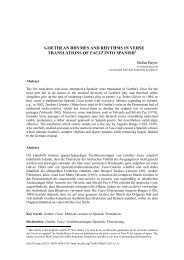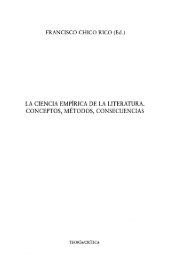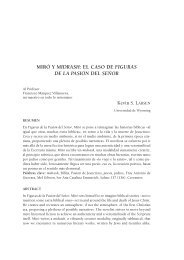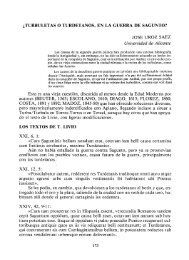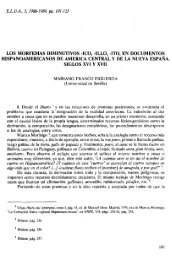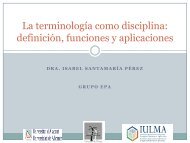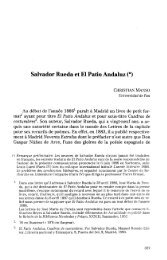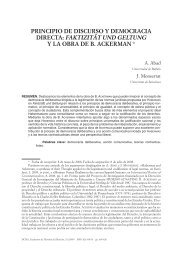Conceptual Metaphors in Taboo-Induced Lexical Variation
Conceptual Metaphors in Taboo-Induced Lexical Variation
Conceptual Metaphors in Taboo-Induced Lexical Variation
Create successful ePaper yourself
Turn your PDF publications into a flip-book with our unique Google optimized e-Paper software.
<strong>Conceptual</strong> <strong>Metaphors</strong> <strong>in</strong> <strong>Taboo</strong>-<strong>Induced</strong> <strong>Lexical</strong> <strong>Variation</strong> 65<br />
has contam<strong>in</strong>ated the literal non-taboo sense. In fact, when us<strong>in</strong>g the word polla <strong>in</strong><br />
Spanish, the sexual sense dom<strong>in</strong>ates. Because of this contam<strong>in</strong>ation with the sexual<br />
concept, people will not risk be<strong>in</strong>g misunderstood, so when us<strong>in</strong>g polla <strong>in</strong> the non-sexual<br />
sense they would certa<strong>in</strong>ly avoid this word and choose others free from sexual<br />
connotations.<br />
Words and phrases from the taboo area of death have been also lexicalized, though <strong>in</strong><br />
this area the process of lexicalization affects the axiology of the word <strong>in</strong> a different way.<br />
Take for example the expression pass away, an old euphemism which dates back to the<br />
fourteenth century (Ayto 2007: 234). In this explicit euphemistic verb which refers to the<br />
act of dy<strong>in</strong>g the taboo figurative sense is more salient than the literal sense of the verb, 14<br />
the same as happened <strong>in</strong> the sexual taboo. However, despite be<strong>in</strong>g closely connected with<br />
the taboo topic it stands for, pass away constitutes a euphemistic alternative to the<br />
straightforward reference to the taboo. It has not been, for the time be<strong>in</strong>g, contam<strong>in</strong>ated by<br />
the taboo topic it denotes and stands as a common way to refer to the act of dy<strong>in</strong>g show<strong>in</strong>g<br />
respect towards the deceased, his or her family and towards the subject of death itself, as<br />
happens <strong>in</strong> the follow<strong>in</strong>g example:<br />
(10) Unfortunately, the <strong>in</strong>jection did not work and despite much medication to calm his<br />
heart, he passed away <strong>in</strong> the early hours of the morn<strong>in</strong>g. (BNC: A17, 1131)<br />
The euphemistic <strong>in</strong>tention of pass away is clear <strong>in</strong> the context of this example. Therefore,<br />
and <strong>in</strong> spite of the fact that this expression has lost its ambiguity and refers to the death<br />
taboo <strong>in</strong> an undeviat<strong>in</strong>g way, it can be considered as a consolatory metaphorical verb. Its<br />
euphemistic mean<strong>in</strong>g derives from its <strong>in</strong>clusion <strong>in</strong> the conceptualization DEATH IS A<br />
JOURNEY, source of many other death-related euphemistic substitutes like go, leave,<br />
depart, pass on, etc. (cf. Crespo Fernández 2011: 207–212) which aim at assist<strong>in</strong>g those<br />
left alive <strong>in</strong> cop<strong>in</strong>g with the pa<strong>in</strong> of loss. The underly<strong>in</strong>g notion of these consolatory<br />
metaphors is that the deceased corresponds to the person who has been capable of<br />
embark<strong>in</strong>g on a journey, and, for this reason, is considered somehow alive.<br />
Us<strong>in</strong>g metaphors with a lexicalized mean<strong>in</strong>g <strong>in</strong> discourse has an important<br />
consequence for one of the basic aspects of the standard CMT approach, the pr<strong>in</strong>ciple of<br />
unidirectionality, accord<strong>in</strong>g to which the associative process <strong>in</strong>variably goes from the<br />
source doma<strong>in</strong> to the target doma<strong>in</strong>: “[M]app<strong>in</strong>g <strong>in</strong> metaphor is always unidirectional:<br />
only the source is projected onto the target doma<strong>in</strong>, and the target doma<strong>in</strong> is not at the<br />
same time mapped onto the source doma<strong>in</strong>” (Barcelona 2003: 114). However, as I<br />
demonstrated <strong>in</strong> a previous article (Crespo Fernández 2009) not always are metaphorical<br />
projections unidirectional. In metaphorical units <strong>in</strong> which the figurative mean<strong>in</strong>g has been<br />
lexicalized and has replaced the orig<strong>in</strong>al mean<strong>in</strong>g, the target doma<strong>in</strong> may be projected onto<br />
the source doma<strong>in</strong>. In words like come, cock or pansy, as the tabooed conceptual traits<br />
have progressively become an <strong>in</strong>tegral part <strong>in</strong> the reference of the word, the sexual taboo<br />
will activate, either consciously or not, <strong>in</strong> the <strong>in</strong>terpretation of such terms. Consider the<br />
follow<strong>in</strong>g onl<strong>in</strong>e conversation <strong>in</strong> the form of posted messages, taken from an Internet<br />
forum:





